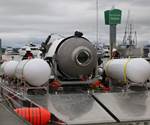Titan reaches 4,000m depth
The carbon-fiber hull submersible reaches another milestone as it prepares for it expedition to explore the wreck of the RMS Titanic next year.
OceanGate (Everett, WA, US) announced June 27 the successful unmanned depth test of the manned submersible, Titan, to validate the hull to a depth of 4,000m (13,123 ft). Titan is one of only five known manned submersibles in the world capable of reaching this depth and the only one that is privately owned.
Designed and engineered by OceanGate, Titan is constructed from carbon fiber and titanium and is the largest submersible of its type in the world. The sub is scheduled to survey the wreck of the RMS Titanic in June of 2019.
As part of Titan’s extensive testing program, the OceanGate team conducted a series of unmanned dives by lowering the submersible on a monofilament line incrementally to 4,000 m. Onboard the sub, strain gauges, viewport displacement sensors and a custom designed acoustic sensor system measured the health of the hull to provide data that the team analyzed during and between dives. Many of these sensors will remain permanently mounted in the sub and will give the pilot real-time feedback on hull behavior on all future manned dives.
Following the cable test, Stockton Rush, OceanGate’s CEO and Chief Pilot, will dive solo in incremental depths until reaching 4,000m.
“There is so much left to learn about the ocean,” comments Rush, “With Titan, we can now take people to see more than half of the world’s ocean. It is the lifeline of our planet, and I believe the future of mankind lies beneath the surface, not out in space.”
Titan’s Titanic Survey Expedition is a 6-week research expedition to digitally document and preserve the historic shipwreck site. The data collected will be used to create a 3D virtual model of the wreck which will be used to assess the environmental impact of the hundreds of thousands of other shipwrecks around the globe.
Related Content
-
Recycling end-of-life composite parts: New methods, markets
From infrastructure solutions to consumer products, Polish recycler Anmet and Netherlands-based researchers are developing new methods for repurposing wind turbine blades and other composite parts.
-
Plant tour: Daher Shap’in TechCenter and composites production plant, Saint-Aignan-de-Grandlieu, France
Co-located R&D and production advance OOA thermosets, thermoplastics, welding, recycling and digital technologies for faster processing and certification of lighter, more sustainable composites.
-
Recycling hydrogen tanks to produce automotive structural components
Voith Composites and partners develop recycling solutions for hydrogen storage tanks and manufacturing methods to produce automotive parts from the recycled materials.
















